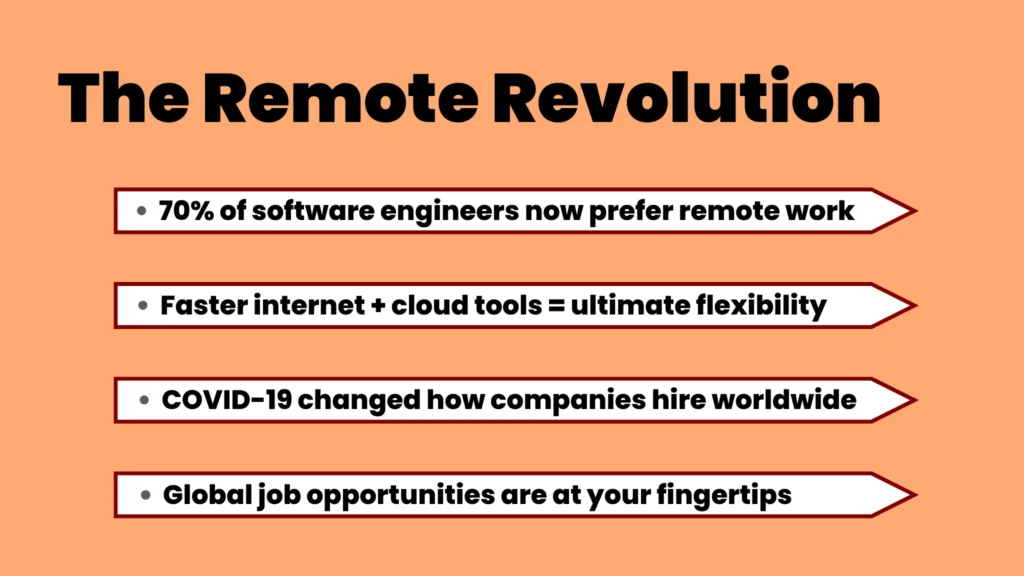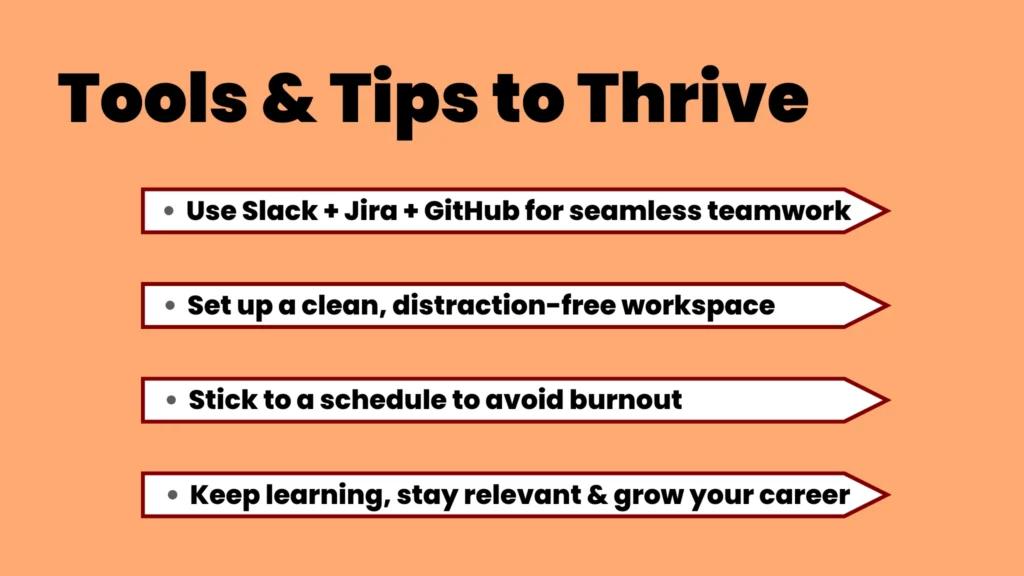Can Software Engineers Work from Home? A Complete Guide

If you’ve ever found yourself wondering, “Can software engineers work from home?” you’re not alone. Over the past decade, the tech industry has transformed rapidly, and one of the biggest shifts has been the rise of remote work.
For developers, this has opened up an entirely new way of working one where your productivity, career growth, and opportunities are no longer tied to a physical office.
The short answer? Yes, software engineers can absolutely work from home. But the real story is much deeper than simply setting up your laptop in the living room and logging in.
Remote work for engineers involves adapting to new workflows, adopting better tools, and learning how to manage productivity and communication effectively.
In this comprehensive guide, we’ll talk about:
- How remote work has evolved for software engineers
- Why working from home has become so popular in tech
- The advantages and challenges of remote development work
- Best practices to maximize your productivity as a remote engineer
- Tools every software developer needs for effective collaboration
- How managers can build successful distributed teams
- What the future holds for software engineers working remotely
By the end, you’ll have a complete roadmap to understand not just whether software engineers can work from home, but how to make it successful and sustainable.
1. Understanding the Remote Work Revolution for Software Engineers
Before we go further, let’s revisit the central question: Can software engineers work from home? Absolutely, but to understand why, we need to look at how the tech industry evolved to make this possible.
The Evolution of Remote Software Development
A decade ago, software engineering was mostly office-centric. Teams relied on in-person collaboration, brainstorming on whiteboards, running stand-ups in meeting rooms, and debugging code together at the same desk. But with advancements in technology, this model began to change.
- Faster internet speeds made video calls seamless and real-time communication possible.
- Cloud-based platforms like AWS, GitHub, and Google Workspace allowed developers to work on shared codebases from anywhere.
- Project management tools like Jira, Trello, and Asana made tracking workflows easy across time zones.
Slowly, companies realized that location wasn’t a barrier to productivity anymore. The shift from physical collaboration to digital-first development laid the foundation for remote software engineering.
The Pandemic Acceleration- Engineers work from home
While remote work was already growing, the COVID-19 pandemic drastically changed everything. Almost overnight, companies had no choice but to go fully remote. Interestingly, instead of experiencing a drop in productivity, many software teams actually saw a significant boost in efficiency.
According to a 2022 Stack Overflow Developer Survey:
- 65% of developers reported being more productive at home than in the office.
- Companies saved thousands in overhead costs, prompting many to permanently adopt remote or hybrid models.
This period proved that software engineers not only can work from home ,they can thrive there.
Globalization of the Tech Workforce
Another big driver behind remote work is the growing global demand for talent. As a result, companies no longer limit themselves to hiring locally. In fact, whether you’re in Atlanta, Bangalore, or Berlin, as long as you have the right skills, you can work for leading tech companies anywhere in the world.
Furthermore, platforms like Toptal, Upwork, and GitHub Jobs have made it easier than ever for software engineers to find high-paying remote roles without the need to relocate.
Benefits of Working from Home as a Software Engineer
Now, let’s address the big question from a career perspective: Can software engineers work from home and still succeed? The answer is a resounding yes, and here’s why.
Flexibility and Work-Life Balance
One of the biggest perks of remote engineering roles is the incredible flexibility they offer. With no daily commute, no fixed office hours, and more control over your schedule, engineers can better design their work-life balance.
As a result, this flexibility often leads to more time with family and friends, greater opportunities to pursue hobbies and personal projects, and improved mental and physical health.
In fact, a survey by Owl Labs found that 74% of developers reported higher job satisfaction when given the flexibility to manage their own work schedules.
Higher Productivity among engineers’ work from home
Working from home allows engineers to design their own workspace and minimize distractions. Without the constant interruptions of office chatter or unnecessary meetings, many developers find they get into deep focus mode more easily.
Access to Global Opportunities
Remote work removes geographical limits. You can live in a small town yet work for Silicon Valley startups, European fintech companies, or AI-driven research labs in Singapore all without leaving your home.
This freedom has unlocked career growth like never before, giving engineers access to roles that were once out of reach.
Financial Savings
By eliminating commutes, reducing eating-out costs, and cutting down on office wardrobe expenses, software engineers save thousands of dollars annually. Companies benefit too, saving on office rent and operational costs.
Custom Work Environments
One underrated perk? You get to design your ideal workspace. Whether it’s dual monitors, noise-canceling headphones, or a standing desk, working remotely allows you to optimize your environment for productivity and comfort.
Challenges Software Engineers Face When Working from Home
Of course, working remotely isn’t perfect. Asking “Can software engineers work from home?” also means acknowledging the roadblocks you might encounter.
Feelings of Isolation
Without spontaneous chats or team lunches, remote engineers can feel disconnected. Over time, this isolation may affect morale and collaboration.
Communication Barriers
In a physical office, quick questions happen naturally. But remotely, delays in messages or miscommunication over Slack and email can slow progress.
Blurred Boundaries Between Work and Life
When your home doubles as your office, switching off can be difficult. Without clear boundaries, burnout becomes a serious risk.
Home Distractions
From noisy neighbors to Netflix temptations, working from home requires strong self-discipline to stay focused and productive.
Security and Infrastructure Limitations
Software engineers often work on sensitive data. Without secure VPNs, firewalls, and proper setups, companies face cybersecurity risks when teams operate remotely.
Best Practices for Software Engineers Work from Home
To succeed remotely, engineers need structure, discipline, and the right strategies. Here’s how to make the most of it:
Establish a Structured Routine
To stay productive while working remotely, it’s important to stick to a consistent schedule with clearly defined start and end times.
By doing so, you establish a structured routine that builds discipline, enhances focus, and helps maintain a healthy work-life balance. Moreover, following a set schedule prevents overworking and reduces the risk of burnout.
Create a Dedicated Workspace
Even if you live in a small apartment, it’s still essential to carve out a separate area specifically for work. By doing so, you establish a dedicated environment that enhances focus, reduces distractions, and promotes better overall work-life balance.
Additionally, having a clearly defined workspace helps your mind differentiate between professional and personal time, making remote work more productive, structured, and sustainable in the long run.
Prioritize Over-Communication
Check in regularly with teammates through stand-ups, video calls, and progress updates. In remote environments, clear communication prevents misunderstandings.
Embrace Asynchronous Collaboration
Not every decision requires a real-time meeting. Use tools like Notion, Slack threads, and GitHub issues to keep teams aligned without constant calls.
Invest in Your Setup
High-speed internet, ergonomic furniture, noise-canceling headphones, and quality hardware aren’t luxuries they’re productivity essentials.
Essential Tools for Remote Software Engineers
When people ask “Can software engineers work from home?”, the right tools make the answer an easy yes. Here’s what you need:
- Communication Tools → Slack, Microsoft Teams, Zoom
- Project Management → Jira, Trello, Asana
- Version Control → GitHub, GitLab, Bitbucket
- Pair Programming → Visual Studio Live Share, CodeSandbox
- Documentation → Notion, Confluence, Google Docs
- Security → VPNs, two-factor authentication, password managers
6. Managing Remote Software Teams
For engineering managers, making remote work successful requires focusing on outcomes, culture, and support:
- Track results, not hours
- Improve onboarding with documentation and mentorship
- Provide equipment and learning stipends
- Foster a sense of community through virtual team-building
- Support mental health and encourage healthy boundaries
The Future of Software Engineering and Remote Work
Remote work isn’t a temporary trend it’s becoming the new normal. More companies are adopting:
- Fully remote setups with distributed teams
- Hybrid models combining office collaboration with remote flexibility
- Global hiring strategies that prioritize skills over location
For software engineers, this shift means greater freedom, broader opportunities, and increased earning potential.
Should You Work from Home as a Software Engineer?
Ask yourself:
- Do you have a quiet, dedicated workspace?
- Can you manage your schedule without constant supervision?
- Are you comfortable collaborating virtually?
- Does your company provide the tools you need?
If your answers lean yes, then working from home can absolutely be the right choice.
FAQs- Can Engineers Work From Home
Can software engineers work from home without affecting productivity?
Yes, software engineers can work from home without compromising productivity, provided they have the right setup and tools.
In fact, many engineers report higher efficiency when working remotely because they can control their environment and reduce distractions commonly found in traditional office spaces.
By using project management tools, version control systems, and communication platforms, developers can stay organized and maintain a smooth workflow.
With proper time management and discipline, working from home can actually help software engineers achieve better results than working on-site.
Can software engineers work from home for international companies?
Absolutely! Software engineers can work from home for companies located anywhere in the world, especially due to the rise of global hiring and remote-first work cultures. As a result, many international organizations are now actively seeking skilled engineers from different countries because remote setups eliminate geographical barriers.
Whether you’re in Asia, Europe, or the U.S., you can work for top startups, leading tech giants, or freelance clients abroad. Furthermore, platforms like Toptal, Upwork, and LinkedIn have made it easier than ever for developers to secure high-paying remote roles and collaborate seamlessly with global teams.
3. Can software engineers work from home on entry-level jobs?
Yes, even beginners can! Software engineers can work from home at entry-level positions as long as they demonstrate foundational skills in programming, problem-solving, and collaboration.
Many tech companies now offer remote-friendly junior roles where new engineers can learn while contributing to projects.
Although onboarding may be slightly challenging without in-person training, most organizations provide virtual mentorship, documentation, and collaborative tools to help beginners succeed.
By actively communicating with your team and staying proactive, working from home as an entry-level engineer can be a great way to kickstart your career.
Can software engineers work from home and still grow in their careers?
Yes, software engineers can work from home and continue to advance professionally. In fact, remote work often provides greater access to career opportunities because engineers are no longer limited to companies in their local area.
Many developers use their saved commute time to learn new technologies, earn certifications, and work on personal projects that strengthen their portfolios.
Additionally, working with distributed teams exposes engineers to diverse perspectives and global best practices, which can accelerate skill development and career growth.
Final Thoughts
So, can software engineers work from home? Without a doubt, yes. With the right mindset, tools, and structure, remote work offers incredible opportunities for growth, productivity, and balance.
However, success doesn’t happen automatically. To thrive as a remote developer, you’ll need to set clear boundaries, communicate effectively, and continuously adapt your workflows.
The future of software engineering is flexible, global, and remote-friendly. For many, the home office isn’t just a temporary setup it’s the new standard for building amazing products, collaborating with world-class teams, and shaping the future of tech. Stay tuned with Reliable Startup for further info!








